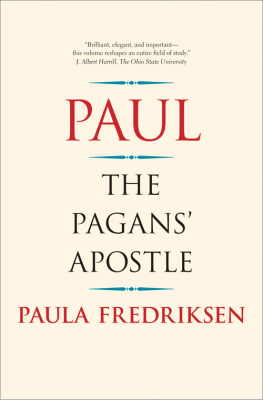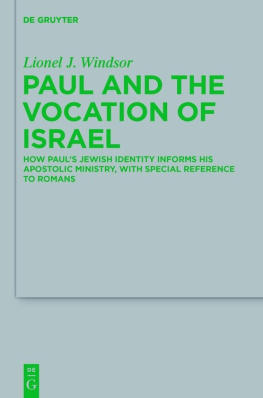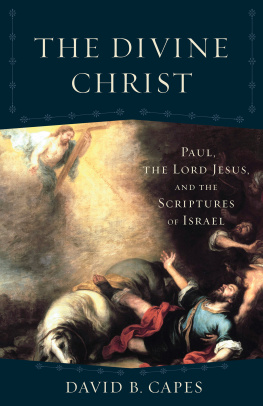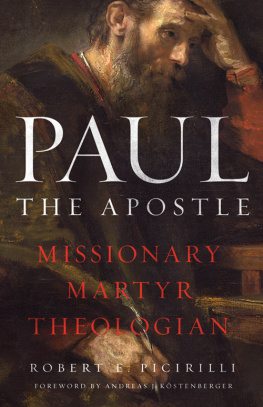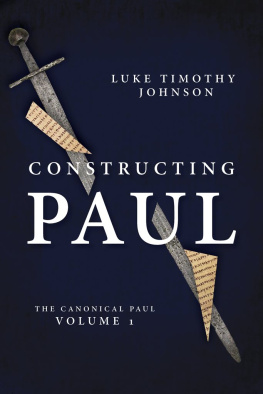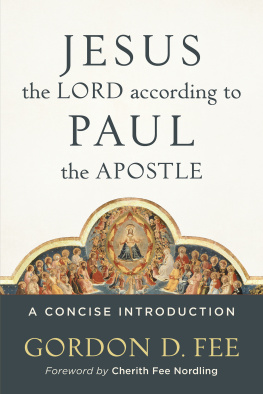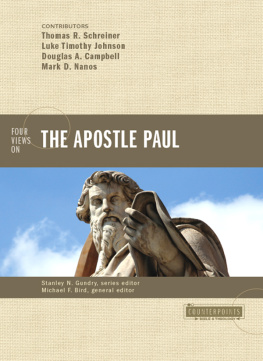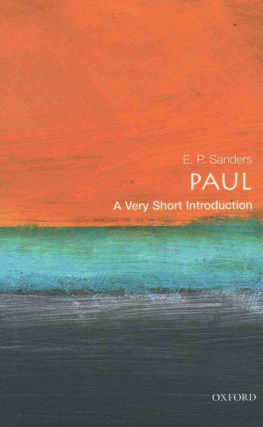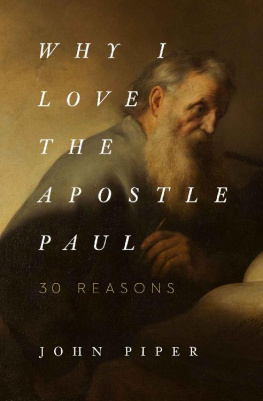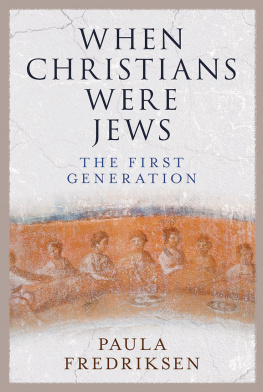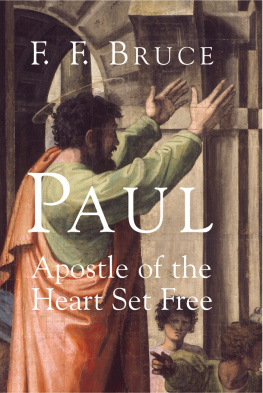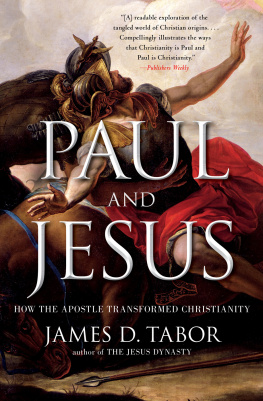P AUL


Published with assistance from the Louis Stern Memorial Fund and from the
Ronald and Betty Miller Turner Publication Fund.
Copyright 2017 by Paula Fredriksen.
All rights reserved.
This book may not be reproduced, in whole or in part, including illustrations,
in any form (beyond that copying permitted by Sections 107 and 108 of the U.S.
Copyright Law and except by reviewers for the public press), without written
permission from the publishers.
Yale University Press books may be purchased in quantity for educational,
business, or promotional use. For information, please e-mail
(U.S. office) or (U.K. office).
Set in PostScript Electra type by IDS Infotech, Ltd.
Printed in the United States of America.
Library of Congress Control Number: 2017931450
ISBN: 978-0-300-22588-4 (hardcover : alk. paper)
A catalogue record for this book is available from the British Library.
This paper meets the requirements of ANSI/NISO Z39.48-1992 (Permanence of
Paper).
10 9 8 7 6 5 4 3 2 1
This is for Krister.
The past is gone; and the truth of what is past lies in
our own judgment, not in the past event itself.
Augustine of Hippo, Contra Faustum 26.5
C ONTENTS

P REFACE

The Kingdom of God, Paul proclaimed, was at hand. His firm belief that he lived and worked in historys final hour is absolutely foundational, shaping everything else that Paul says and does. And this conviction is all the more remarkable when we consider that, by the time that we hear from him, mid-first century, the Kingdom is already late.
We easily lose sight of this fact. Our historical perspective obscures it. We look backward, and for good reason see Pauls epistles as early, a mere couple of decades after Jesuss execution. But while history is always done backward, life is lived only forward, one day at a time. This means that our view of Pauls circumstances and experience can never be the same as Pauls. When the god of Israel revealed his son to Paul (c. 34 C.E. ?), Paul had understood what it meant: the establishment of Gods Kingdom could not be far behind. But Paul gives this interpretation in letters addressed to his gentile community in Corinth some twenty long years after the event (1 Cor 15.1252). Whyhowcan he still be so sure? And in another letter, written even later, we find him yet again asserting the nearness of the End: You know what hour it is, how it is full time now for you to awake from sleep. Our salvation is nearer now than when we first believed. The night is far gone; the day is at hand (Rom 13.1112). How many years, by this point, stood between Paul and his call to proclaim this good news? Whyhowafter the passage of so much time, can Paul still be so sure that he knows the hour on Gods clock?
This is the question that drives the present study. It will lead us into a Jewish world incandescent with apocalyptic hopes: that God verged on realizing his ancient promises to Israel; that the messiah had come, and would soon come again; that the dead were about to be raised and, together with the living, transformed; that the nations and even the nations gods would shortly turn to worship the god of Israel. And it will propel us into a Mediterranean world thick with ancient actors: pagans and Jews; healers and prophets; angels and demons; Greeks and Romans; and, not least, angry superhuman forces, divine powers, and hostile cosmic gods. Both worlds are Pauls, and his convictions about the first shaped his actions in the second.
Paul held these convictions as a committed Jew, and he enacted them as a committed Jew. In brief, so this study will argue, Paul lived his life entirely within his native Judaism. Later traditions, basing themselves on his letters, will displace him from this context. Through the retrospect of history, Paul will be transformed into a convert, an ex- or even an anti-Jew; indeed, into the founder of gentile Christianity. But Paul did not know and could not know what these later generations, looking backward, did know: that his mission would end without the return of the messiah. That shortly after his lifetime, Rome would destroy his gods temple and his city, Jerusalem. That new gentile movements independent of and hostile to Judaism would crystallize around his letters, claiming their theologies as Pauls own.
But Paul lived his lifeas we all must live our livesinnocent of the future. As historians, we conjure that innocence as a disciplined act of imagination, through appeals to our ancient evidence. Only in so doing can we begin to see Paul as Paul saw himself: as Gods prophetic messenger, formed in the womb to carry the good news of impending salvation to the nations, racing on the edge of the End of time.
I NTRODUCTION

T HE M ESSAGE AND THE M ESSENGER
Paul, slave of Jesus Christ, called to be his messenger, set apart for Gods good newspromised beforehand through his prophets in the sacred scripturesconcerning his son, from the seed of David according to the flesh, and declared son of God in power according to the spirit of holiness by the resurrection of the dead: Jesus Christ our lord, through whom we have received grace and apostleship in order to bring the obedience of faithfulness on behalf of his name to all the nations, including to you.
Romans 1.16
This is Pauls self-introduction, midcentury, to a community that he did not yet know: former pagans, now followers of Christ, gathered in the empires capital city, Rome. His opening lines reveal much about the dramatic transformations of this upstart Jewish movement in the decades following Jesuss death. Jesus himself, teaching in Aramaic, had gone to fellow Jews in the Galilee and in Judea. Moving between villages and his peoples sacred citadel, the temple in Jerusalem,
Paul, Jesuss slave (doulos) and messenger (apostolos), continued to proclaim this message; but he lived and worked in a much bigger world. Paul taught, thought, and heard scripture in Greek, the English of
In the time between Jesus and Paul, more than the ethnicity of their respective audiences had shifted. The content of their message, this good news, had altered too. Jesus, if we can trust the later gospel portraits of him, had summoned his Jewish audiences to repent of their sins in preparation for the Kingdoms coming. The Kingdom of God is at hand: Repent, and trust in the good news! (Mk 1.15). Within its original intra-Jewish context, this call to repentance had specific content. Meta no eite, the Greek word that the gospels used for Jesuss summons, implies a change of mind (nous means mind in Greek). But this idea rests on the Hebrew word tshuv, turn, hence the later rabbinic term for repentance, tshuvah. Turning from sin within a Jewish context meant, specifically, returning to the covenant between God and Israel, that is, to the teachings of the Torah.
Other traditions about John the Baptizer and about Jesus also point in this direction of linking Torah-observance/
Next page
